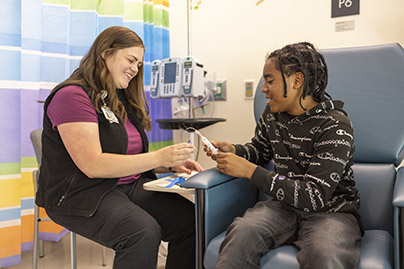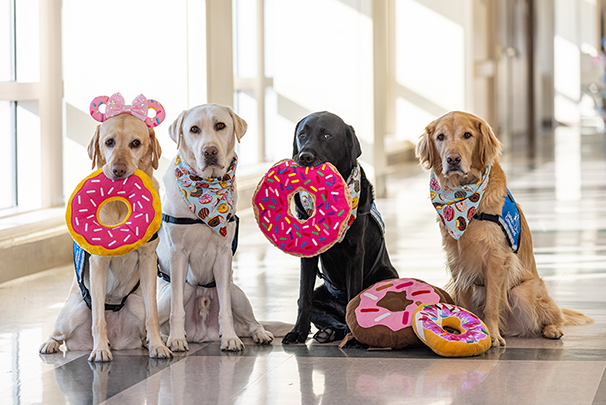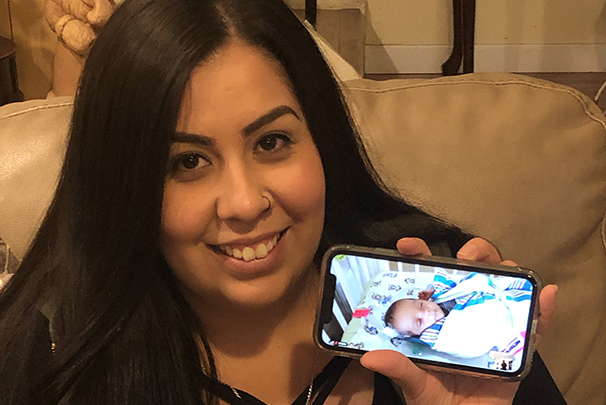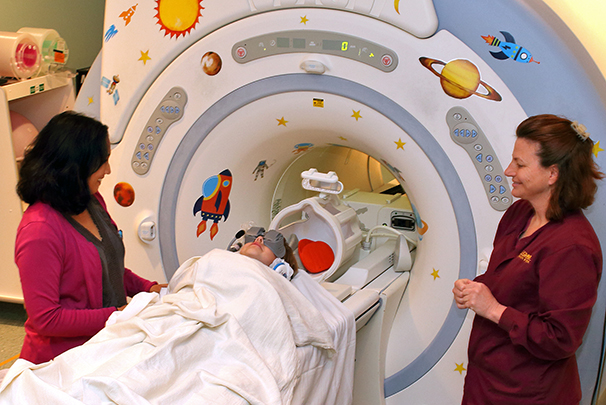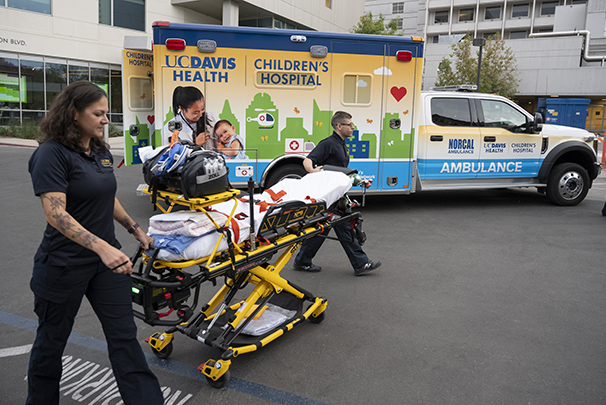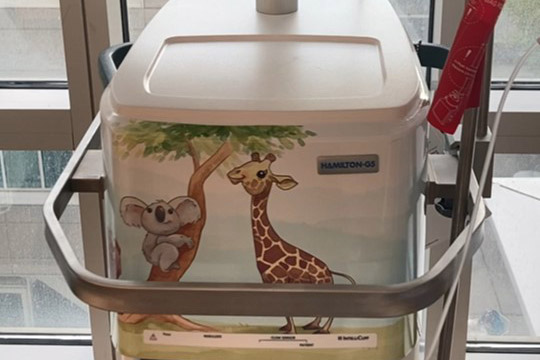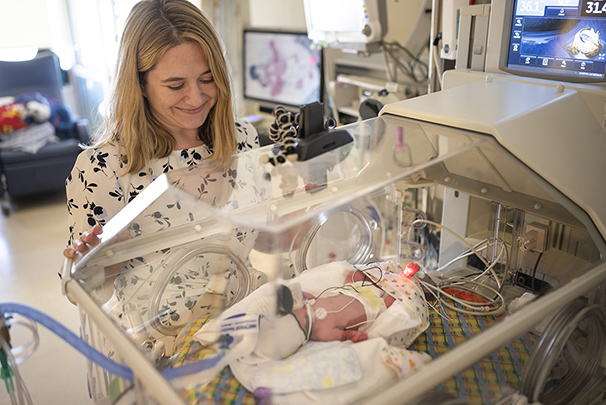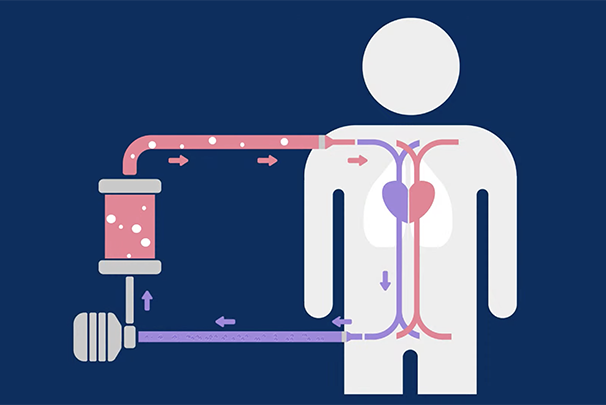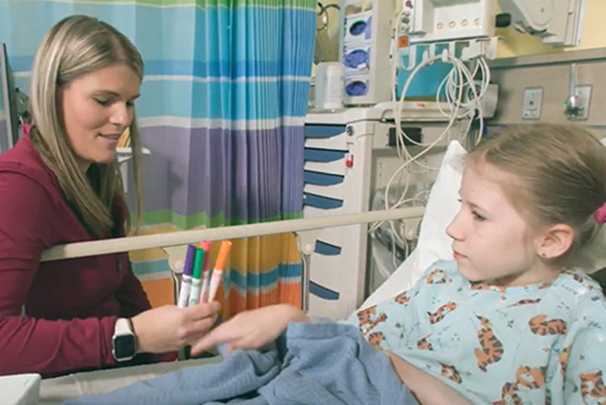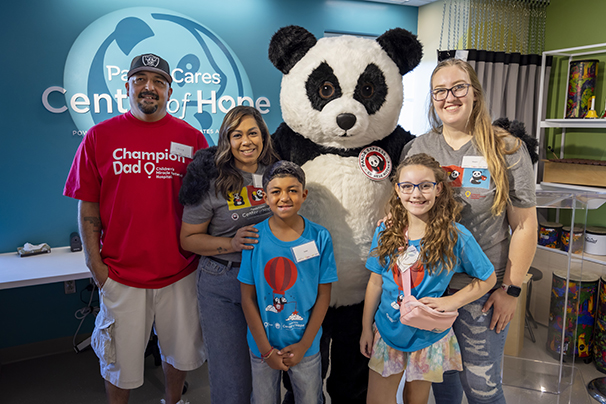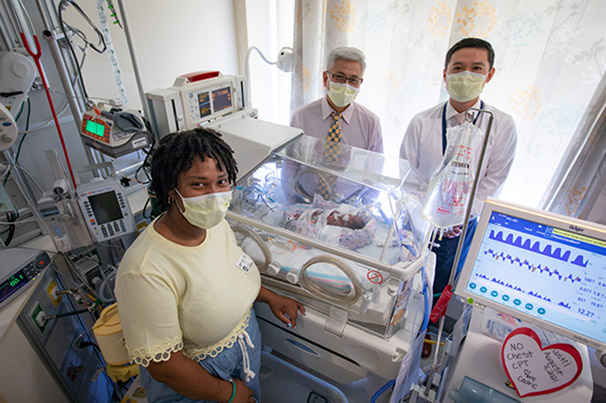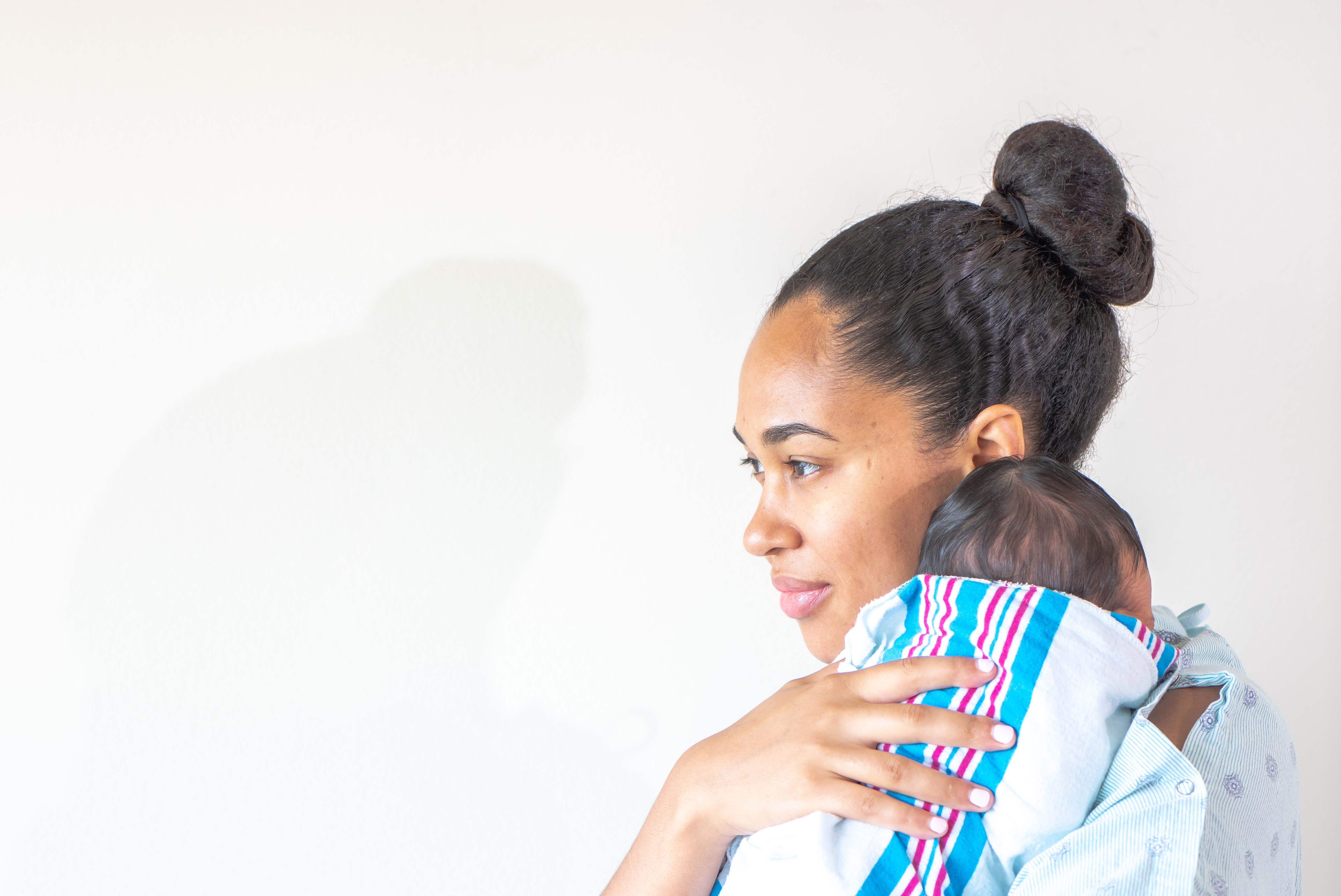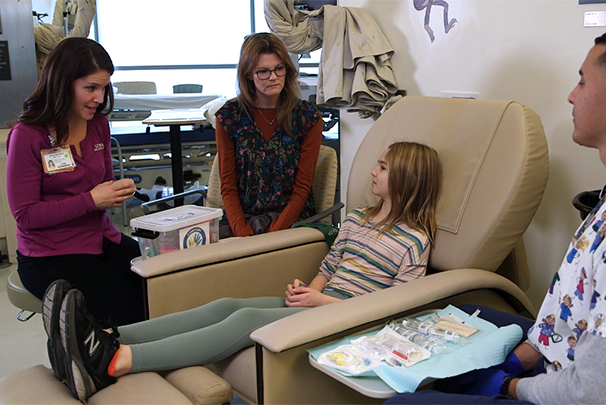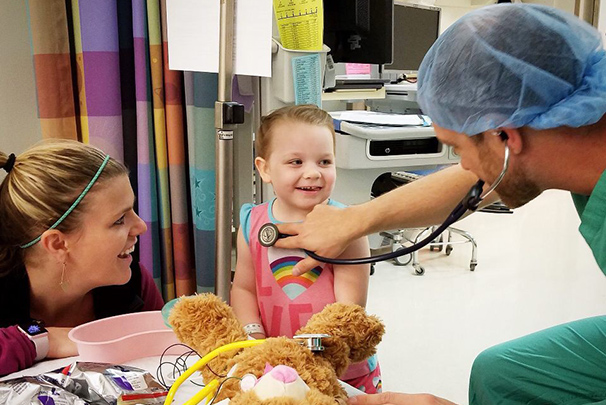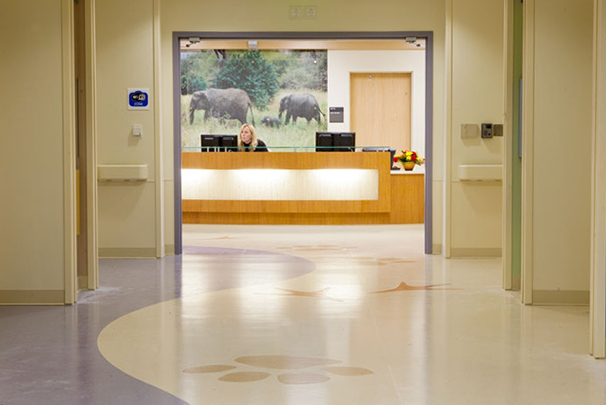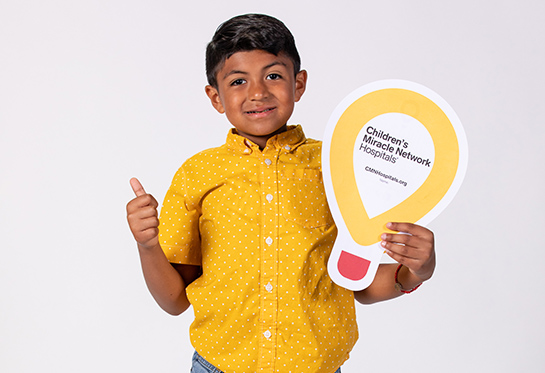Children’s Miracle Network at UC Davis
Your Donations in Action

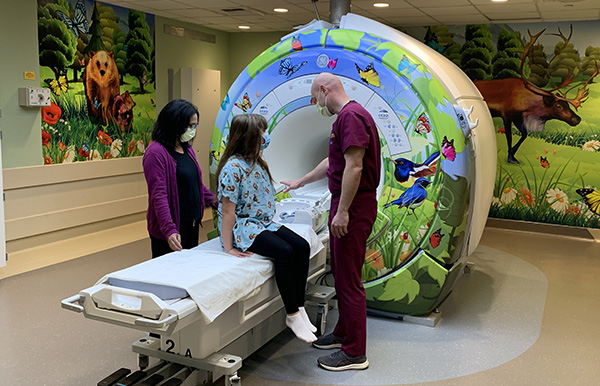
UC Davis Children’s Hospital tour - A Children’s Miracle Network hospital
Each year, Children’s Miracle Network at UC Davis supports grants funding that is typically 25 percent annual projects and 75 percent strategic initiatives, supporting a full range of children's services including research, education and clinical care. This includes a wonderful history of endowments to bring the best and most highly skilled care providers to our region.
Every Dollar Counts
Your donations create miracles by funding medical care, research, equipment and programs that save and improve the lives of children at UC Davis Children’s Hospital.
Any UC Davis faculty or staff member may apply for grant funding for clinical and research programs. Proposed projects must have a primary focus on directly improving the health and welfare of children, particularly those served by UC Davis Children’s Hospital. The grants are two years in duration and requested funds cannot exceed $50,000 (maximum total for two years).
Grants at a Glance
- Children’s Miracle Network (CMN) grants to UC Davis Children's Hospital for 2025
- Children’s Miracle Network (CMN) grants to UC Davis Children's Hospital for 2024
- Children’s Miracle Network (CMN) grants to UC Davis Children’s Hospital for 2022
- Children’s Miracle Network (CMN) grants to UC Davis Children’s Hospital for 2021
- Children’s Miracle Network (CMN) grants to UC Davis Children’s Hospital for 2020
Donations by Category
CMN donations fund equipment, research, programs and patient care. Explore the examples listed below to learn more. Also, download our donations in action poster, or our donations in action poster in Spanish for more information.
-
Summer Camp Program
A free summer camp geared for kids with liver disease is now being offered. Designed by pediatric gastroenterology physicians, YMCA certified group fitness instructors, personal trainers, nutritionists and summer camp professionals, pediatric patients ages 8 to 15 can learn life-changing tools for healthy living.
-
Child Life and Creative Arts Therapy
Read moreChild life specialists are experts in child development who focus on the emotional well-being of hospitalized children and their families to reduce anxiety and promote coping. Coping is supported through play, self-expressive activities and age-appropriate medical preparation and education.
-
Art Therapy
Read moreArt therapy is a non-verbal form of therapy that promotes self-expression, communication and coping through art. Art therapists provide individual and group art therapy sessions for children to improve the physical, mental and emotional well-being of patients and families.
-
Music Therapy
Read moreMusic therapy combines music interventions and techniques to help patients cope with being in the hospital. From managing and decreasing pain and anxiety, to expressing feelings, music therapists help patients heal by collaborating directly with the care team to provide appropriate music therapy services throughout hospitalization.
-
Facility Dog Program
Donate to the facility dog programSick or injured kids can sometimes be afraid of visiting the hospital for treatment. But then, a dog walks in the room and everything seems better. That’s the power of facility dogs. Generous donations started the facility dog program and now there are four dogs throughout the hospital to help lessen a patient’s stress or pain.
-

Aromatherapy Program
Care teams now have a scentsational option to reduce anxiety, increase relaxation and alleviate nausea: personal aromatherapy nasal inhalers. AethereoSticks portable aromatherapy devices resemble lip balm tubes and are infused with essential oils. Patients hold the tube near the nose and take deep breaths.
-

Sibling Support Program
MIND Institute programs for siblings of kids who have autism, ADHD, fragile X syndrome or other developmental disabilities have been expanded. In-person sessions are now available to siblings, including older teens.
-
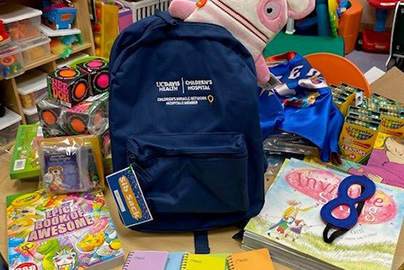
Sib Sacks
When a child is hospitalized, their siblings are at risk of suffering emotional and psychological distress. The Sib Sack was designed to help brothers and sisters better cope by validating their feelings and fostering communication, creativity and self-expression. This child life program helps create a more inclusive, family-centered experience for our patients.
-
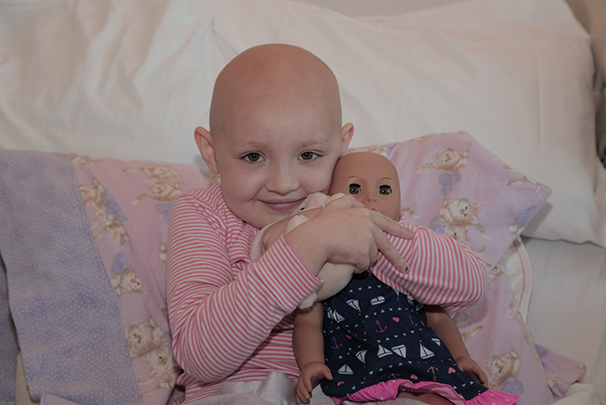
American Girl Dolls
When a child is treated for cancer, they may lose their hair. One therapeutic tool to help kids cope is a doll that looks like them. When treatment ends and hair grows back, the American Girl doll gets new hair, too.
-
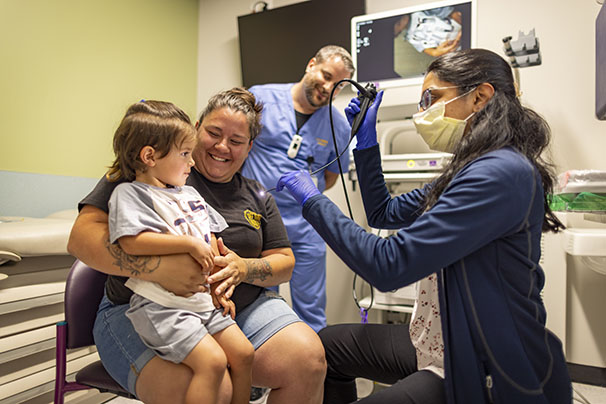
Laryngoscopy
There's a new diagnostic tool available to pediatric patients experiencing pulmonary and sleep-related challenges: flexible laryngoscopy. This bedside procedure is now being offered in the pediatric pulmonology and sleep clinics at UC Davis Health, the only place offering this service in the Sacramento area.
-
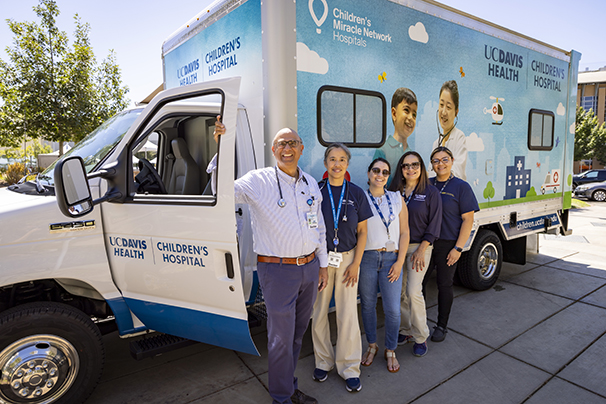
Mobile Clinic
This mobile clinic provides pediatric health care to historically marginalized populations in the Sacramento region. Our goal is to prioritize the health care needs of these patients and this mobile van allows our providers to use a person-centered, culturally sensitive approach to individualize care.
-
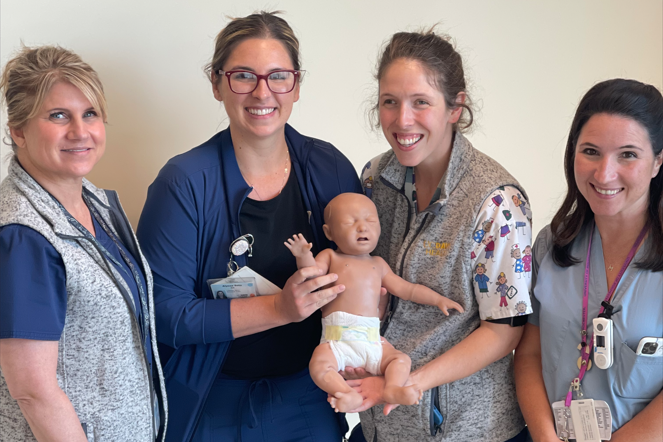
Patient Simulator
Super Tory is an advanced newborn patient simulator. It was developed to provide training in real environments. Active movement, real patient monitoring and all-day battery life are just a few features of this manikin that helps our team save lives.
-
NICU Webcams
Read moreNeonatal Intensive Care Unit (NICU) stays can often be lengthy. Sometimes, babies need to stay in the hospital for months. When families can’t be at their baby’s bedside, they can still see their child on their cellphone or tablet, thanks to FamilyLink, our NICU webcams program.
-
Movie goggles - Pediatric MRI without general anesthesia
MRI Goggles
Read moreLying still in an MRI machine can be hard for kids, but donors have helped make the process easier and more fun for kids by purchasing MRI goggles so kids can watch their favorite movie during the procedure.
-
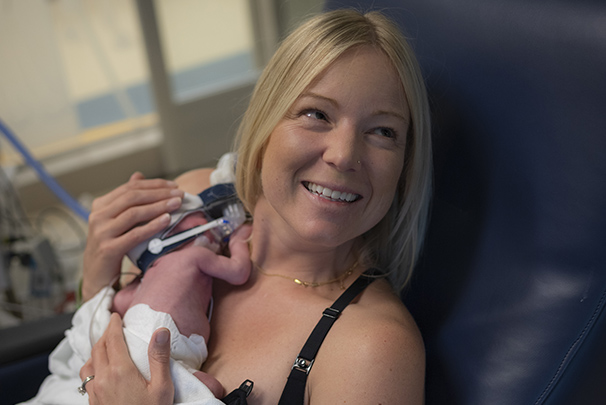
Milk Analyzer
Premature babies need extra nutrition. The Human Milk Analyzer machine determines which key nutrients could be added to mom’s breast milk to help each preemie get exactly what they need.
-
360° video: Explore the new ambulance for UC Davis Children's Hospital
Child-friendly Ambulance
The child-friendly design and state-of-the-art medical features of our ambulance allow our Transport Team to get the tiniest of patients to our hospital safely within our 33-county coverage area. This ambulance is operated by NORCAL Ambulance.
-
Decorative Ventilator Wraps
Decorative ventilator wraps help engage kids and ease anxiety, providing an opportunity for children in treatment feel safer and more comfortable within the PICU/PCICU. Animal, space, dinosaur and ocean themes provide positive distractions by adding kid-friendly elements to the clinical setting.
-
Giraffe Beds
Premature babies often have underdeveloped systems. They need additional protection once they are out of their mother’s womb. We have Giraffe beds in our NICU specifically designed for their needs.
-
What is ECMO? - Lifesaving support for failing organs (including COVID-19 cases)
ECMO/ECLS Machine
Read moreECMO is short for Extracorporeal Membrane Oxygenation. The ECMO machine allows blood to be pumped outside the body when the heart and lungs need help healing. Doctors at UC Davis Children’s Hospital use the ECMO machine to help save the lives of area children.
-
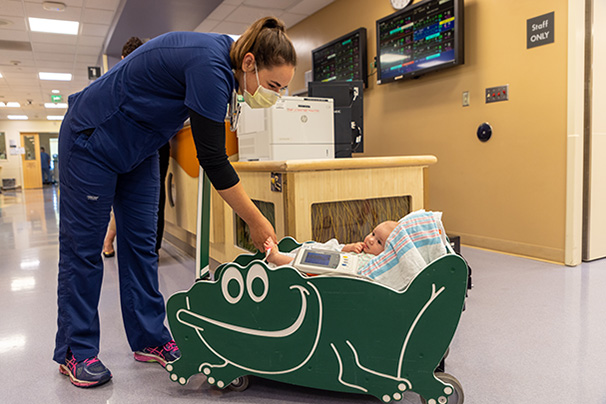
Wireless Monitors in the PICU
Pediatric intensive care unit patients are now able to leave their rooms while still being safely monitored. A wireless technology upgrade gives staff access to patient vitals via central screens, allowing kids more freedom during treatment.
-
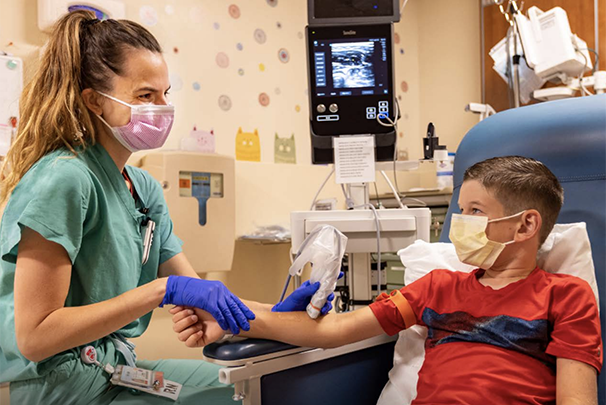
Vascular Ultrasound
Children’s veins are hard to see. That often means more “pokes.” A new, portable ultrasound machine helps staff better see the veins. This minimizes needle placement attempts and more importantly, lessens stress and pain for the patient.
-
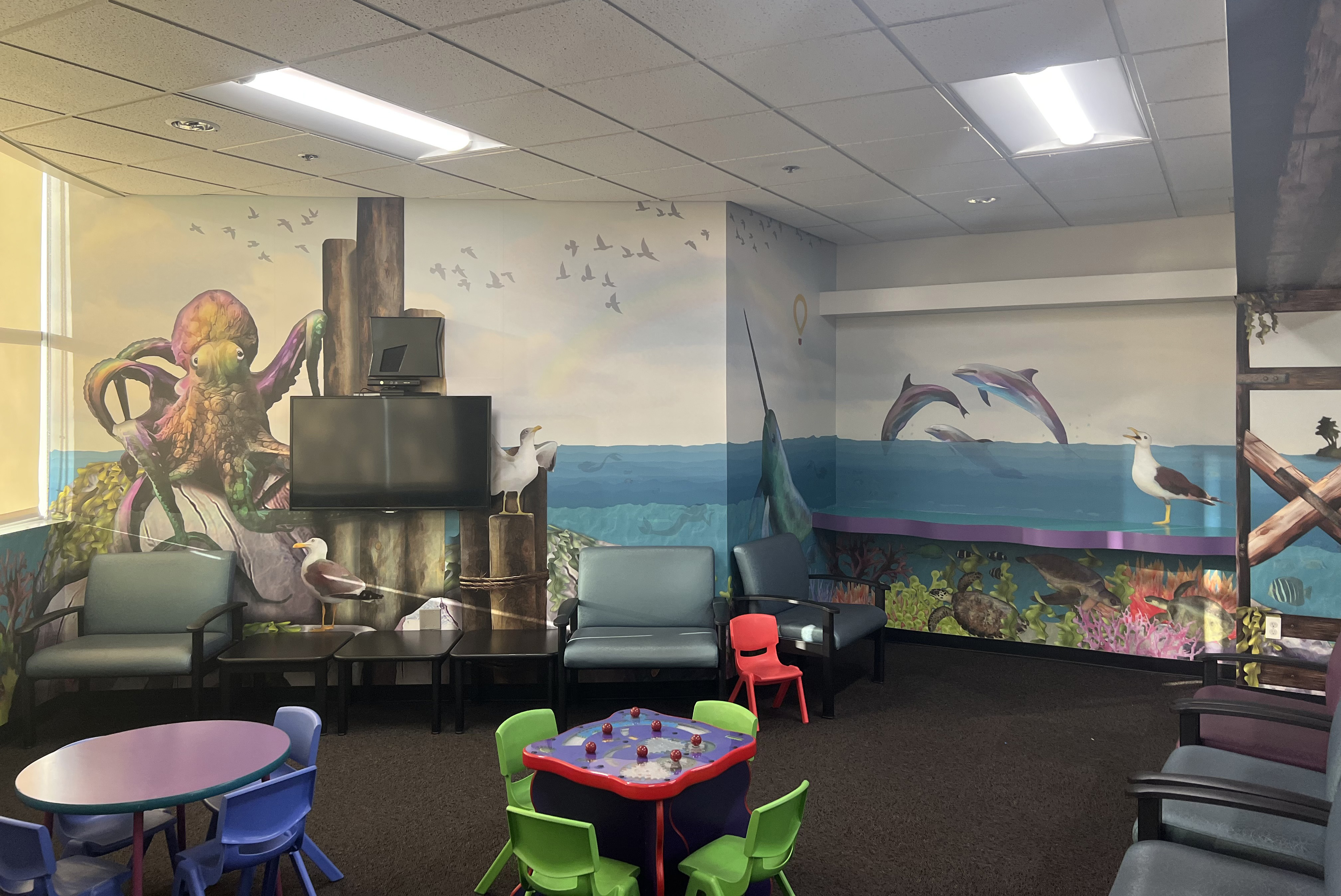
Clinic Makeover
This makeover of the pulmonology, cardiology and endocrinology space is a pier complete with lighthouses, sea life and pirate ships. The kid-friendly design helps pediatric patients feel more comfortable in a clinic setting.
-
PATH Program
Read moreThis unique, first-in-the-nation program called PATH (Promoting Accessibility To Healthcare) aims to improve health care experiences for neurodiverse children and their families. The PATH program starts by getting basic information about their likes, dislikes and sensory needs. This patient-centered approach helps inform the way the health care team interacts with the patient every time they come for care.
-
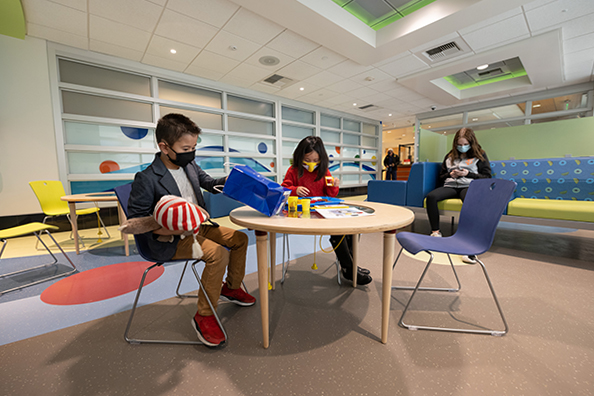
Pediatric Emergency Room Makeover
Our pediatric emergency department provides state-of-the-art, level 1 pediatric trauma care, 24 hours a day, seven days a week. A recent redesign of the space allows families to await treatment in a child-friendly and family-focused pediatric waiting room, separate from the adult emergency department waiting area.
-
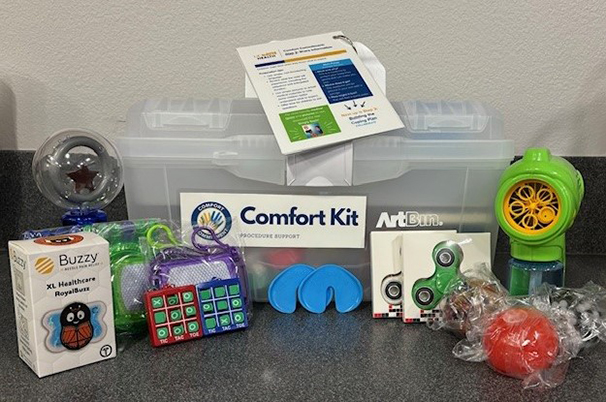
Comfort Kit
The comfort commitment is a 4-step process designed to optimize care for pediatric procedures. Step 3 is a coping plan which includes a comfort kit. The kits are equipped with distraction items and sensory tools to comfort pediatric patients during procedures.
-
Watch Video
Panda Cares Center of Hope
New activity room to engage pediatric patients in art, science, music, reading, computer technology, video production and school activities. Programs and services fall within the four pillars of the Panda Care Center of Hope: physical, emotional, mental and spiritual.
-
Watch Video
UC Davis Children's Hospital Tour Video
Read moreThe UC Davis Children’s Hospital tour video highlights the comprehensive range of services and quality care offered to families at our nationally ranked, comprehensive hospital for children and a proud member of Children’s Miracle Network (CMN) Hospitals.
-
Infant Safety Videos
When parents leave the hospital with their newborn, they often have questions about how to care for them. Videos on safe sleep practices, soothing a crying baby and infant cardiopulmonary resuscitation (CPR) provide parents with valuable information.
-
Comfort Commitment
Read moreBeing hospitalized for treatment can sometimes involve painful procedures. We now have a program that helps strengthen coping abilities and unifies comfort measures throughout the children’s hospital.
-
Children’s Surgery Center
Read moreOur Children’s Surgery Center was the first on the West Coast to receive the Level l designation. What does that mean? It means we provide the highest quality of children's surgical care in an environment that’s designed for kids.
-
PICU/PCICU expansion
Read moreOur pediatric and cardiac intensive care unit (PICU/PCICU) offers care for the most critically ill and injured kids. We treat traumatic injuries, life-threatening diseases and birth defects, providing care for 1,600+ pediatric patients annually.
-
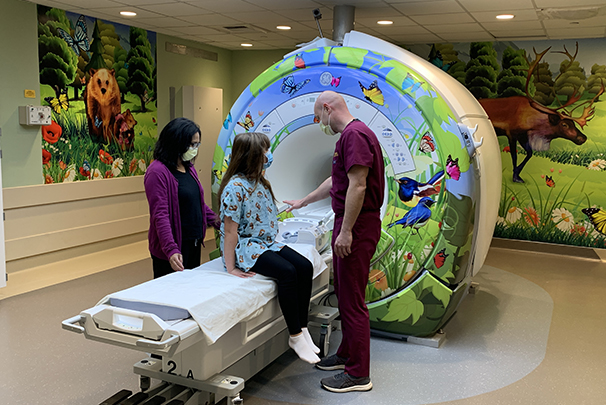
MRI Room Makeover
When pediatric patients have an MRI – or Magnetic Resonance Imaging – it can be stressful. New colorful, themed murals help children relax and provide a distraction during the procedure. Research also shows that when kids are calmer, less sedation is required to complete the procedure.
-
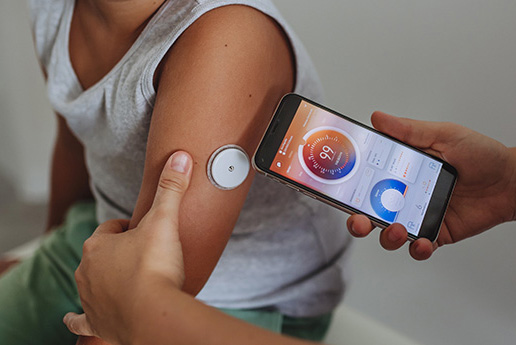
Research on Technology Barriers for Spanish-speaking Kids with Type I Diabetes
Children with type 1 diabetes benefit from technology to help manage their blood sugar level. A UC Davis study finds that if kids with type 1 diabetes come from predominantly Spanish-speaking households, they are less likely than other children to use insulin pumps and CGM devices.
-
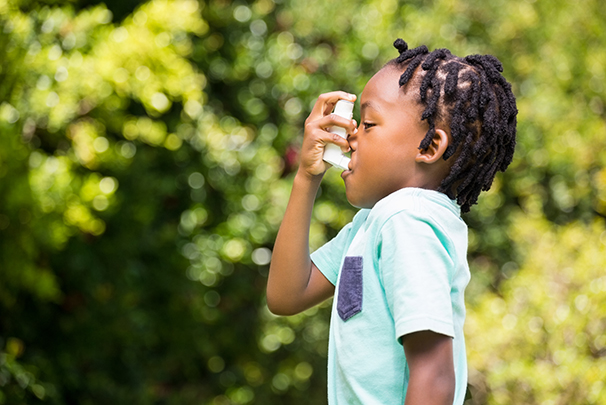
Asthma Care Research to Minimize Health Disparities
Studies of children with asthma indicate they miss more than double the number of school days than those without asthma. Researchers identified that a combination of telemedicine and in-person visits helped children needing asthma care. This combination helped minimize health disparities, maximize patient experience and increase access for children and young adults.
-
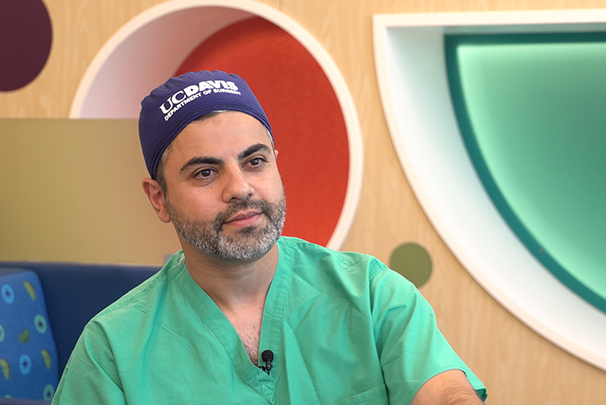
Hirschsprung’s Disease Testing Research
Hirschsprung’s disease is a congenital condition present at birth. It is the result of nerve cells missing in the muscles of a baby's colon, affecting the large intestine and causing problems passing stool. Pediatric surgeon Payam Saadai made a medical discovery: a short and less-invasive diagnostic test for Hirschsprung’s disease.
-

Epinephrine Use in the Delivery Room
Epinephrine (adrenaline) is used in the delivery room to resuscitate newborn infants who have a low heart rate and are not responding to coordinated chest compressions and positive pressure ventilation. A Children’s Miracle Network (CMN) Hospitals research grant allowed UC Davis Health Researchers to review previous studies and publish a commentary in the journal Pediatric Research on the efficacy of epinephrine during neonatal resuscitation.
Contact Us
Children’s Miracle Network at UC Davis
4900 Broadway, Suite 1150
Sacramento, CA 95820



